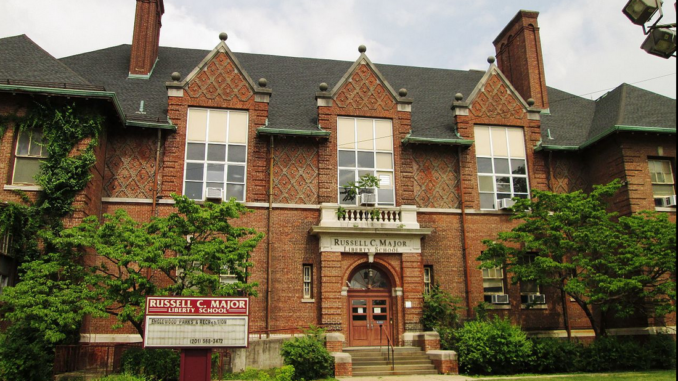
Editor’s note: This story, first published Tuesday, Feb. 18, was updated for our print edition on Feb. 21, and continues below.
ENGLEWOOD, N.J.—A proposal for an $18,600 “environmental assessment” of Liberty School—the nearly 120-year-old historic building whose fate council and community members have debated for years with no action taken—was approved at the Feb. 18 City Council meeting.
The resolution awarding the contract was approved as part of the council’s “consent agenda” and members offered no comments.
On Feb. 4, however, Interim City Manager Jewel Thompson-Chin said that the study by T&M Associates was due to “concerns” about possible environmental issues there.
She said the study would likely be included for interested parties should the city decide to issue a future request for proposals.
The study includes a preliminary building assessment, and testing for asbestos, lead-based paint, and universal waste.
It notes a 30-45 day timeline for completion.
The “universal waste survey” involves visual inspection of the building for PCB-containing electrical equipment such as transformers and light ballasts, plus potential mercury liquid-filled equipment and refrigerant systems.
‘Need to be defined’
“We know in advance that there are some environmental issues but they need to be defined,” said Thompson-Chin, discussing the assessment.
She said the study will “document conditions” at Liberty School and that if conditions are severe, a second study may be necessary to detail conditions and offer options.
Thompson-Chin said “any concerns or red flags” may also require a Phase II environmental study to follow-up.
Answering Councilwoman Katharine Glynn’s question Feb. 4, she said she anticipated study results in about a month.
‘Positive first step’
Approving an environmental study was viewed as a “positive first step” for future preservation and use of Liberty School by Pastor Sanetta Ponton of Metro Community Church in Englewood.
Ponton and an architect hired by Metro Community Church presented a proposal for a 55,000-square-foot community center at Liberty School to City Council in December 2019.
Ponton estimated the building’s cost between $12 million to $15 million. Already, church members have raised over $1 million in a capital campaign to construct a new church facility and community center, Ponton said.
Ponton’s architect presented a number of detailed drawings that showed it would preserve Liberty School’s historic facades and include a three-story, 15,000-square-foot addition.
She said several times during her presentation that she hoped the council would consider the church’s proposal and work together to begin conversations about their proposal.
Despite a follow-up email to council members, no further communication occurred, she said.
Community Center or ratables?
“We’re hoping that an environmental study is helpful to us and can give us a potential understanding of what we are getting ourselves into. This [community center] proposal is not going to be a never-ending process for us. The question is, do they want a community center at all, or do they only want new development to bring in ratables?” said Ponton.
Ponton said some preliminary inspections of Liberty School by a contractor who offered an unofficial evaluation found evidence of asbestos and lead paint, not surprising in a 120-year-old structure.
“We would love to be able to sit down and talk about the actual proposal and gain access to the school,” Ponton said.
She said Metro Community Church spent tens of thousands of dollars to conduct preliminary investigations and develop its Liberty School proposal.
‘A volatile issue’
Ponton said she realizes the fate of Liberty School is “a volatile issue for the council” as it’s one of the last historic buildings in Englewood centrally located near a busy downtown nexus.
“It’s in a wonderful location. It anchors the downtown and it’s right across from apartments being built directly across the street,” noted Ponton.
Ponton noted the impacts of “gentrification”—displacement of lower-income families as a neighborhood renovates and land values and taxes increase—is happening in the city “and people feel pushed out and neglected.”
She said the church’s proposal cannot compete with development that brings in tax revenues.
Ponton said the community center/church facility it proposes would be devoted to community programs for at least six days a week and only partially used for services on Sundays.
Contacted about the Metro Church proposal, Mayor Michael Wildes called for a “provocative use of space” at Liberty School, and possibly a mixed-use development with residential and retail use. He said steps to focus on Liberty School “should have been taken a decade ago.”
‘Commitment to Englewood’
“Our commitment to Englewood and working alongside of the city to develop a community center at Liberty School remains…We hope the Council will seriously consider issuing an RFP in the very near future, to which Metro absolutely intends to respond,” emailed Ponton to council members Dec. 12, following up on her presentation to the council.
Ponton said she received no replies.
Church awaits City Council
Ponton said then the church would not proceed forward with Liberty School plans without guidance from council members.
Frequent calls for action over the last few years by residents on the now-shuttered Liberty School have mostly gone unanswered.
In 2019, members often cited the half-dozen public forums contracted for with a consultant as the first step to gauge public opinion on a community center at Liberty School.
However, only one forum was held in May 2019 by the consultant, and no follow-up or further forums were held.
The city declared Liberty School and the surrounding site “an area in need of redevelopment” in early 2018 based on an evaluation that determined the grounds to be in poor shape and due to its “smart growth” location near a pedestrian-friendly downtown, shopping and public transit.
